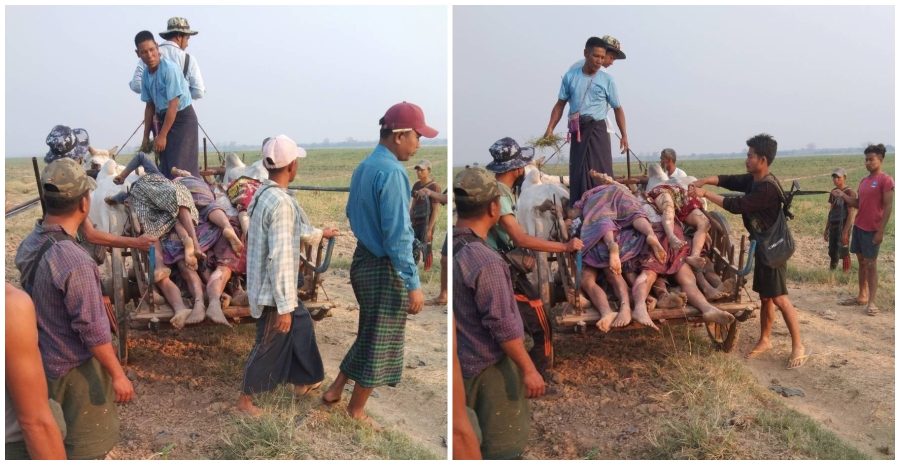The UN Special Rapporteur and rights groups have condemned the international community for its failure to take effective action over the past two years, which has emboldened the Myanmar military junta to double down on its brutal tactics against the population.
Clear evidence for this lack of action can be seen in the junta’s recent massacres, indiscriminate aerial bombardments and artillery strikes, mass arson attacks, and new horrors in the forms of beheadings and dismemberment of detained resistance members and civilians as it struggles to bring the country under control.
Speaking at the United Nations General Assembly on March 16, UN special envoy to Myanmar Noeleen Heyzer said the impact of the military rule in its third year has been “devastating”.
“Violence continues at an alarming scale,” she said in her grim assessment of conflict-ridden Myanmar. Heyzer was speaking nearly seven months after her meeting with junta chief Min Aung Hlaing in Naypyitaw, which ended in failure and her call to stop the deadly violence ignored.
Just one week before the assembly, junta troops massacred 22 civilians including a female resident and three Buddhist monks during a raid on Nam Name village in Pinlaung Township, southern Shan State.
On March 1, junta troops detained 16 civilians and a resistance leader at Tar Taing village in Myinmu Township, Sagaing Region. All were found the next day after being brutally slain.

The savage attack on the leader saw his head, hands, and legs dismembered and his abdomen cut open. Three women among the detainees were also reportedly raped before being killed.
These two incidents are just the most recent mass killings that junta troops have committed. Since the coup in February 2021, the junta has committed 64 massacres, killing at least 766 people, according to the civilian National Unity Government. This year alone, regime troops have massacred 104 people.
More than 3,100 civilians had been killed and more than 16,000 political prisoners remain under detention, rights group Assistance Association for Political prisoners stated.
Adding to the horror of junta atrocities and killings that are taking place daily across the country is the world’s inaction over the Myanmar people’s plea for support and protection from the military regime’s violence.
The Progressive Voice rights group reported on March 12 that the lack of robust actions from the international community, particularly the UN and ASEAN, has helped the Myanmar junta to escalate its atrocities.
Rights groups have pointed to the failure of ASEAN’s peace plan, the so-called five-point consensus, and the junta’s disregard of the UN Security Council resolution, which was only adopted in December, nearly two years after the coup. The resolution calls for an immediate end to all forms of violence throughout the country and the release of political prisoners including former civilian leader Daw Aung San Suu Kyi.
Amid intensifying deadly violence in Myanmar at the hands of junta troops in defiance of the resolution in recent months, Human Rights Watch stressed the need to adopt concrete action to staunch the daily atrocities being carried out in the country.
“Myanmar’s junta has demonstrated that it is impervious to statements of condemnation or concern,” said Louis Charbonneau, UN director at Human Rights Watch. “Its disregard of the Security Council’s December resolution shows the need for a new resolution imposing strong measures like an arms embargo and targeted sanctions for senior military officials and companies linked to the military.”
Progressive Voice also said in its March 12 report that only concrete actions from the international community can prevent the loss of innocent lives and end the regime’s atrocities – “not just statements on a piece of paper.”
The Progressive Voice and 160 other rights groups called on UN member states to impose coordinated sanctions on aviation fuel and a global arms embargo on the junta to save millions of lives in Myanmar.
They also called for the UN Human Rights Council (UNHRC) to refer the situation in Myanmar to the International Criminal Court (ICC) and encourage UN member states, agencies, and mechanisms to support ongoing universal jurisdiction cases against the junta in Argentina, Germany, Indonesia, and Turkey.
Tom Andrews, Special Rapporteur for human rights in Myanmar, told the UNHRC on Monday that the global community must do more to support the people of Myanmar.
He said the international community was not doing nearly enough and failing the people of Myanmar who are pursuing a heroic campaign in defending the country.
He added that a minority of member states and non-state entities were continuing to provide the junta with weapons, materials to manufacture weapons, and/or revenue that were being used to commit war crimes and crimes against humanity.
The international community’s treatment of those fleeing Myanmar has also been wholly inadequate, he said.
Myanmar nationals in neighboring countries enjoy few legal protections and face the risk of arrest, detention, deportation, pushbacks at land and sea, and obstruction of their access to UNHCR, refugee status determination, and resettlement, he pointed out, urging better support.
Those member states that had taken action, such as targeted sanctions or weapons bans, had failed to do so in a strategic and coordinated fashion.
He called for the creation of a working coalition of nations who are willing to stand with the people of Myanmar, to identify actions that would have the greatest impact and coordinate their implementation.
“The people of Myanmar have continued to demonstrate remarkable courage and tenacity in the defense of their country and the human rights of its people. They deserve solidarity and support,” Andrews said.

















